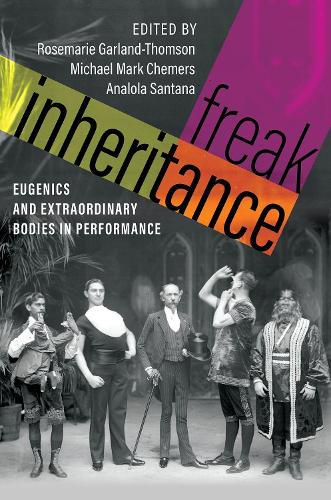Readings Newsletter
Become a Readings Member to make your shopping experience even easier.
Sign in or sign up for free!
You’re not far away from qualifying for FREE standard shipping within Australia
You’ve qualified for FREE standard shipping within Australia
The cart is loading…






The long-awaited follow-up to Garland-Thomson's field-defining book Freakery, Freak Inheritance illuminates the convergence of the freak show era with the eugenics era, explicating the cultural work of the freak show as a compelling range of performances of cultural and social Others that emerge as eugenic targets from the late 19th century into the 20th century and beyond. This book explores the wildly popular performances that told compelling stories about categories of people that scientific and social-scientific discourses increasingly described - and sometimes still describe - as biologically inferior. Although much work has emerged recently about the history of eugenics, this collection highlights the specific ways that modes of exaggerated commercial popular performances create a public conversation that mirrors pathological narratives of human difference that are now firmly established as the categories of normal and abnormal, healthy and diseased, beneficial and harmful. This connection between narratives of freakery and normalcy gesture towards a fuller understanding of how eugenic thinking has re-emerged strongly as a force in medical science and cultural thinking aimed at producing the supposed
$9.00 standard shipping within Australia
FREE standard shipping within Australia for orders over $100.00
Express & International shipping calculated at checkout
The long-awaited follow-up to Garland-Thomson's field-defining book Freakery, Freak Inheritance illuminates the convergence of the freak show era with the eugenics era, explicating the cultural work of the freak show as a compelling range of performances of cultural and social Others that emerge as eugenic targets from the late 19th century into the 20th century and beyond. This book explores the wildly popular performances that told compelling stories about categories of people that scientific and social-scientific discourses increasingly described - and sometimes still describe - as biologically inferior. Although much work has emerged recently about the history of eugenics, this collection highlights the specific ways that modes of exaggerated commercial popular performances create a public conversation that mirrors pathological narratives of human difference that are now firmly established as the categories of normal and abnormal, healthy and diseased, beneficial and harmful. This connection between narratives of freakery and normalcy gesture towards a fuller understanding of how eugenic thinking has re-emerged strongly as a force in medical science and cultural thinking aimed at producing the supposed